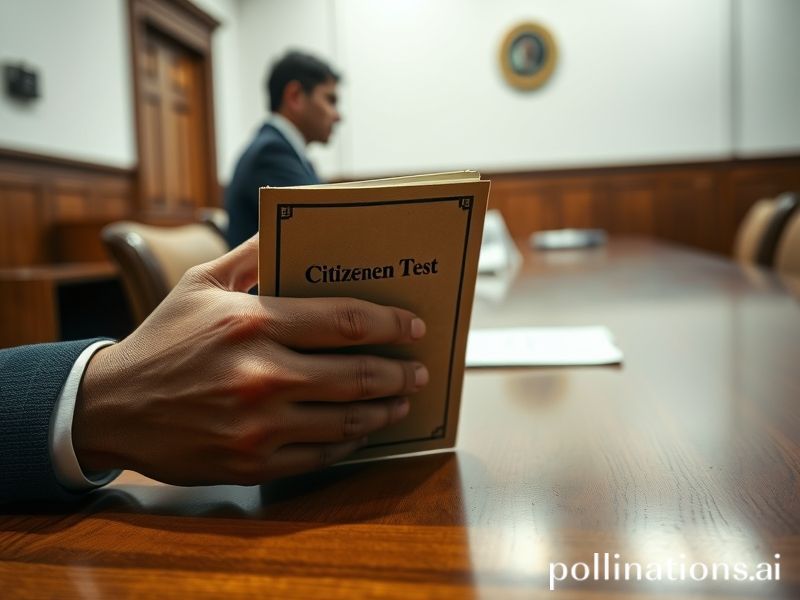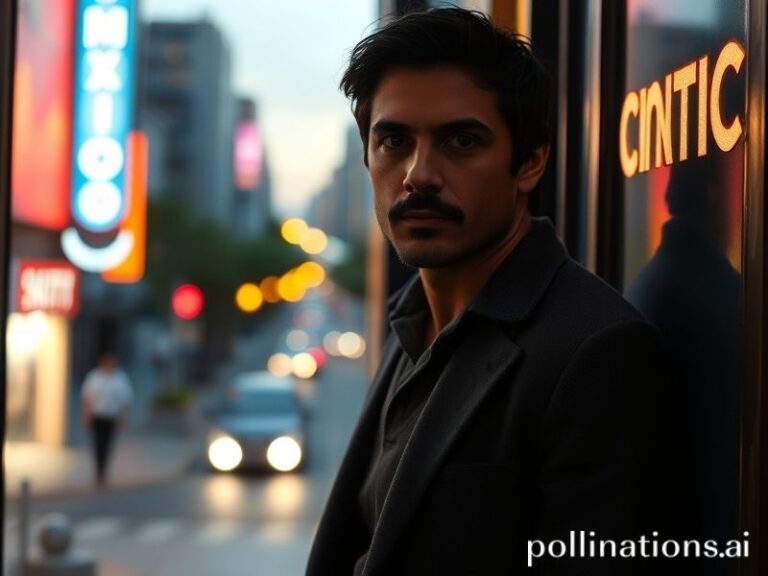citizenship test
They say a passport is just a very expensive souvenir, but try explaining that to the 1.2 billion people who don’t have one that actually works. From the maple-scented booklet in Toronto to the burgundy talisman coveted in Lagos, the modern “citizenship test” has become less a quiz on parliamentary trivia and more a global audition for the right not to be strip-searched at Heathrow. Welcome to the bureaucratic Hunger Games—may the odds be ever in your tax bracket.
Let’s begin where all good myths begin: at the departure gate. In 2023, the Henley Passport Index crowned Singaporeans the undisputed VIPs of planetary movement, able to sashay visa-free into 193 destinations. Meanwhile, Afghans—who apparently drew the short straw in the cosmic green-card lottery—can visit 27 countries without a pre-emptive grovel. Geography, meet karma, and karma’s got a backlog.
But the passport is merely the golden ticket; the citizenship test is the chocolate-factory obstacle course. Take the United Kingdom, which asks applicants to calculate the precise year the Huguenots arrived while humming Elgar. Or Australia, where you must solemnly affirm that mateship is a value, not a dating app. Across the Channel, France insists you know how many commas are in the first paragraph of the Declaration of the Rights of Man—trick question, liberté is allergic to punctuation.
The unspoken rule is that the richer the country, the more whimsical the trivia. Denmark recently floated a question about the average wind-speed of a migrating swan, presumably to weed out anyone who isn’t part goose. Canada, forever the polite bouncer, merely asks newcomers to pledge not to start a bar fight over hockey. If only geopolitics were so simple.
Yet the citizenship test is no longer a quaint multiple-choice relic. It is a geopolitical flex, a soft-power flexing of triceps under tailored sleeves. The United Arab Emirates has introduced a “golden visa” track for influencers, because nothing says nation-building like a TikTok star who can juggle falcons. Israel offers fast-track naturalization to anyone who can prove Jewish ancestry up to King David—genealogists in Tel Aviv are working overtime, and ancestry.com stock is doing brisk business.
In the global south, the test is often outsourced to reality. Lebanon’s exam involves surviving power cuts long enough to fill out the form. Venezuela’s version is simpler: can you swim across the Darien Gap without being eaten by a crocodile or a cartel? Pass, and you’re welcomed in Chile with open arms and a 90-day visa—fail, and you’re an anecdote in a UNHCR spreadsheet.
The darker punchline is that citizenship itself is becoming a tradable asset. Caribbean islands hawk passports the way street vendors sell mangoes: Antigua will throw in visa-free Russia if you buy beachfront acreage; St. Kitts sweetens the deal with a commemorative plaque. Critics call it “passport apartheid”; marketers prefer “investment migration.” Either way, the global elite now collect nationalities the way teenagers collect Pokémon—gotta catch ’em all before the taxman evolves.
Technocratic dreamers promise digital citizenship on the blockchain, where your nationality is an NFT that can be staked, traded, or accidentally deleted with a misplaced password. Estonia already offers e-residency to anyone with a laptop and a willingness to pretend Tallinn is the new Palo Alto. The program’s slogan—“Location is dead”—feels less like liberation and more like a threat, especially if you’re still stuck in a place where the Wi-Fi dies every time it rains.
So what does the citizenship test ultimately test? Memory, yes; loyalty, maybe; but mostly the ability to pretend that invisible lines on a map are worth memorizing swan migration data. It measures our collective amnesia about how arbitrary it all is—how yesterday’s invader becomes today’s native son, provided he passes the spelling section.
As dusk settles on another day of visa queues and biometric selfies, one truth glints beneath the fluorescent lights: we are all, in the end, just tourists on a rotating rock, clutching pieces of paper that claim we belong somewhere. Until the swans change their flight path, and the questions change again.







